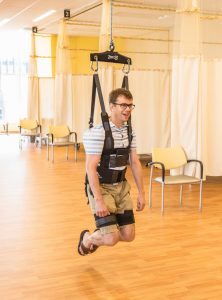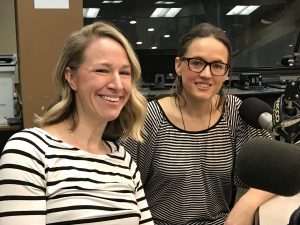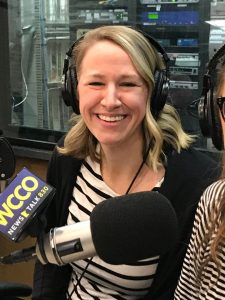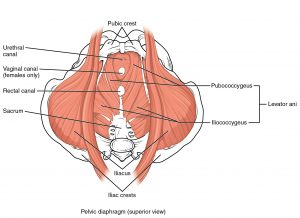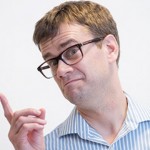Hello, friends!
I’ve been on a two month hiatus from writing but I’m back. Of course, I’ve still been filling the airwaves with medical shenanigans every Sunday morning on Healthy Matters (which you can hear at wccoradio.com at 7:30 Central Time). In fact, last Sunday was the first show of our 11th year broadcasting Hennepin Healthcare‘s brand of accessible, accurate, and hopefully lighthearted medical information. To all of you who listen to the show, THANK YOU!
We started 2019 by talking about Physical Therapy and what it can do for you and your painful and sore bodies. It turns out that Hennepin (my health system) has probably Minnesota’s most technologically-advanced Physical Therapy gym. That’s me in the zero-gravity harness which helps people with stroke, traumatic brain injury, or other injuries safely learn to walk again. The PT department also has a dizzying (pun intended) range of services.
I encourage you to check out the Hennepin Healthcare Department of Physical Therapy and learn about treatments for:
- Dizziness/vestibular problems
- Traumatic brain injury
- Women’s prenatal, post-partum, and incontinence issues
- Orthopedic therapies
- Stroke care
- Lymphedema
- Mobility issues, including canes, walkers, and wheelchairs
- Pediatric physical therapy
- And much more!
But more than machines and technology, the Physical Therapy department at Hennepin has awesome people. So to launch our 11th year, I invited two of them to help listeners navigate Physical Therapy (I’ll call it PT from now on). Joining me in studio were two Doctors of Physical Therapy, Beth Stegora and Kelly Rettman.
That’s the two of them in the WCCO studios
If you missed the show, check out the podcast of Healthy Matters show #521, January 6, 2019 here with all commercial interruptions conveniently removed.
In this post, I’ll summarize a couple topics that we covered on the show, like how physical therapy can help people with rotator cuff injuries, knee injuries, and even women with incontinence. Read on for just a few words to get you thinking.
Rotator cuff lets your shoulder . . . rotate
Do not let it be said that I learned nothing in medical school. I know, for instance, that your rotator cuff allows your shoulder and arm to move in just about any direction you want it to, allowing it to . . . wait for it . . . rotate. It does this while still holding the whole shoulder joint in place. The rotator cuff is made up of four muscles and the accompanying tendons and ligaments. As I recall from med school, they can be remembered (or not remembered as the case may be) by the acronym SITS:
- Supraspinatus (Latin for “above the spine” of the scapula, aka shoulder blade)
- Infraspinatus, (“below the spine” of the aforementioned scapula)
- Teres minor (“round and small” – think cylindrical muscle)
- Subscapularis (“beneath the scapula”)
I risk boring you silly with these terms but it does frequently occur that patients will be told that they have injured one or more of these structures so at least you’ve heard of them now. All together they comprise the rotator cuff which allows you to throw a baseball just like Tommy John and swing a golf club like Tiger Woods.
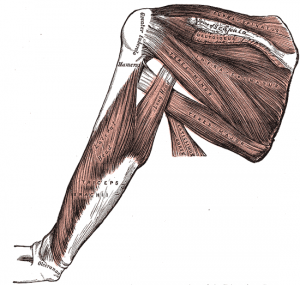
Muscles of the shoulder. The subscapularis is on the other side so not seen here. From Grays Anatomy the textbook not the TV show
You can injure your rotator cuff with progressive small injuries (repetitive overhead reaching, pitching a baseball, playing tennis, etc) which leads to swelling/inflammation and possible impingement of the shoulder. The cuff can also be partially or completely torn through more severe acute injury. The result is pain or ache in the shoulder, difficulty reaching overhead or behind, weakness in the arm, and pain when sleeping on the shoulder.
Physical therapy is almost always my first recommendation for rotator cuff injuries. Once the initial pain is getting better, a physical therapist can help you with range of motion exercises, strengthening of the surrounding muscles, and restoring function to the shoulder. Most people with rotator cuff injuries will not need surgery, even when the muscle is torn. In fact, the pain will often go away with skilled PT. So your first call is not to your surgeon. It’s to your physical therapist.
Recovering from knee surgery
Knee surgery is among the most common orthopedic surgeries people undergo. Sometimes it is a “TKA” or total knee arthoplasty which is basically trading the knees you were born with to a newer more advanced and much more metallic variety. Or knee surgery may be to fix a torn ligament (the dreaded “ACL tear”) or it may be to fix a broken bone in the knee. In all of the above, what you need after knee surgery is physical therapy.
I know about a zillion people with ACL injuries, including a close friend just this week who took out an ACL (anterior cruciate ligament) while doing a face-plant on a ski hill. Ouch ouch ouch.
Dr. Kelly Rettman acknowledged on the radio broadcast that not everybody is, let’s say, appreciative of the instructions given by their physical therapist. Think about it . . . you’ve just had surgery on your knee, the blasted thing hurts like a whole lot, and the PT comes in and tells you to get off your duff and start walking around. Sounds merciless but in fact it is exactly what you need to do. Getting up and moving that knee is so important. It is important immediately after surgery and it is important in the weeks and months following your surgery.
As one Healthy Matters listener said on the program, the PT was one of the most important things he did after his knee surgery.
Need a really good physical therapist in Minnesota? Click here to go to Kelly Rettman’s page at Hennepin. (Don’t worry about the different last name – she’s the same person!) Or call 612-873-6963.
Women and incontinence. PT can help!
Before I met Beth Stegora, I hadn’t really though much about physical therapy as a treatment for incontinence in women. But it turns out that there is a whole subspecialty of PT that addresses this very issue. There are two main groups of women who see Beth but of course she sees men and women alike. The biggest groups are women right around and after giving birth and then again around and after the time of menopause. These are both times when women experience more urinary incontinence.
Here’s the good news from Dr. Stegora. There are effective therapies for women experiencing incontinence. I asked her if Kegel exercises are really “a thing” and she said that indeed Kegel exercises are “a thing” and people can be taught to do them. But much more than that, she has experience working with women in lots of ways to significantly reduce the bothersome or downright awful problems with holding one’s urine.
It makes sense, doesn’t it? The human pelvis is supported by a layer of muscles called the pelvic floor. This holds a woman’s bladder (and uterus) in place. But among the other common changes with childbirth is a weakening of these muscles which can lead to the bladder leaking urine.
And as I’m learning in all this talk about PT, where there are muscles and ligaments that aren’t working right, there are probably physical therapy techniques to strengthen them. And indeed that is exactly the case with women’s physical therapy.
A bit of advice from me. If you are a woman experiencing incontinence , or pregnant, or recently delivered a baby – and you are in the Minneapolis area, go see Beth Stegora. Call 612-873-6963 or go to click on her page at Hennepin Healthcare.
That’s just a sampler of what physical therapists can do for you. I’ll end with one more shot of Kelly setting me up in the zero-gravity machine.
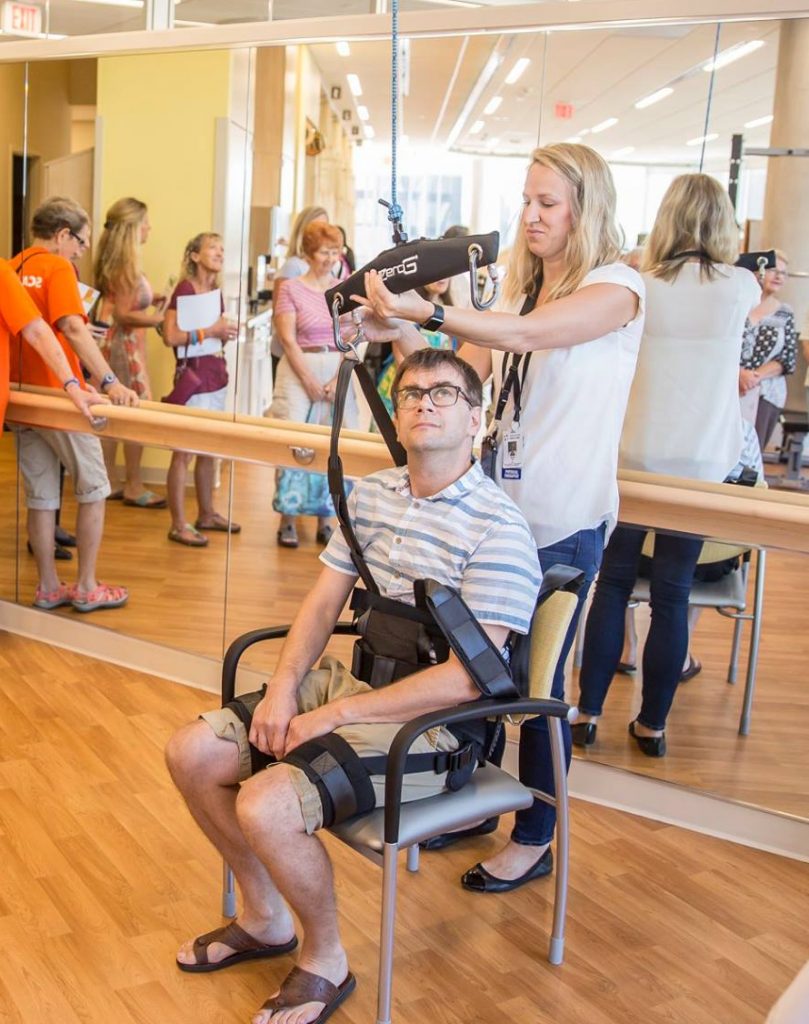
Kelly Rettman hooking me up to the zero-gravity equipment at Hennepin Healthcare. What I won’t do for medical education!
I think I’m ready to join NASA now.
A big thanks to Kelly Rettman and Beth Stegora for sharing their expertise with us all!
Please subscribe by e-mail to this blog, follow me on Twitter @DrDavidHilden, and tune in to Healthy Matters on Sunday mornings at wccoradio.com (you can also find the podcasts there) or tune in on your radio to News Talk 830 WCCO in the Bold North of the US.
-David
